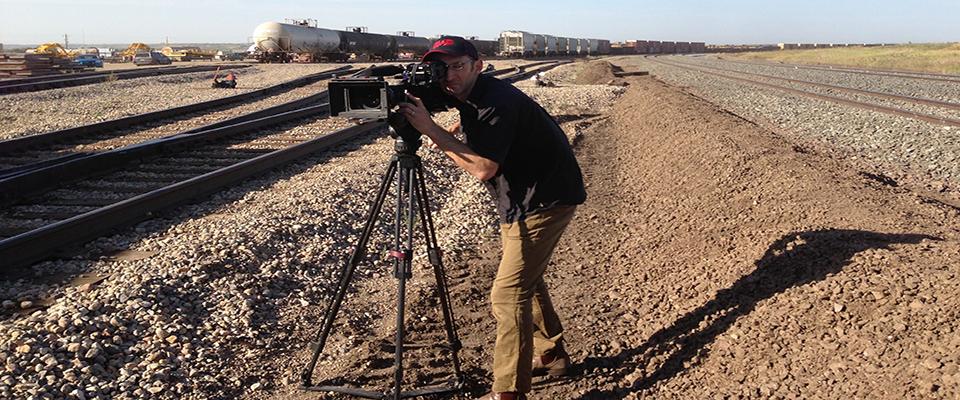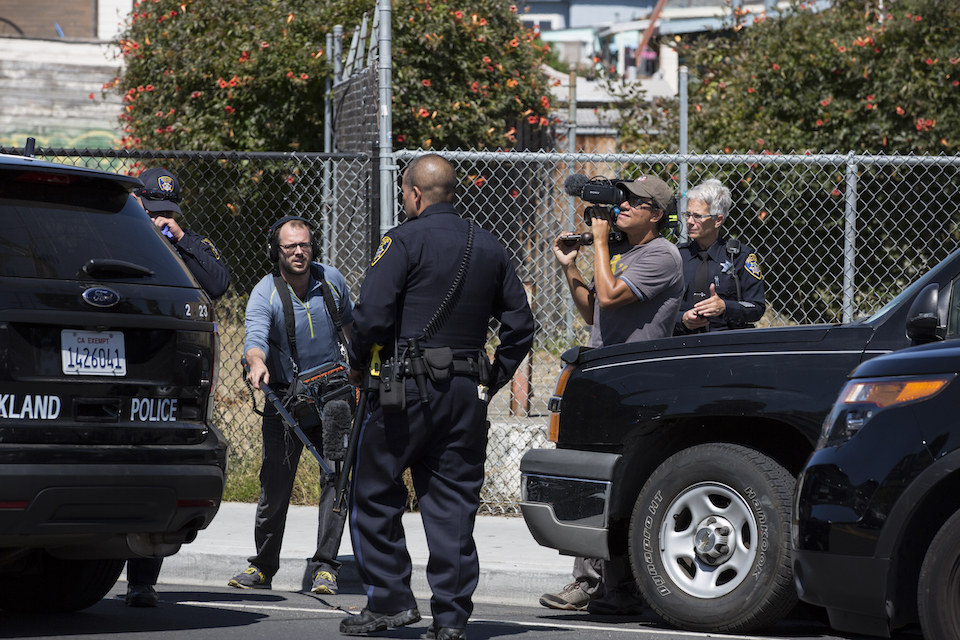A documentary filmmaker goes in search of a story
(Note: In this gritty diary, director Jesse Moss captures his challenges filming “The Overnighters,” which just received the U.S. Documentary Special Jury Award for “intuitive filmmaking” at the 2014 Sundance Film Festival. Moss, who graduated from UC Berkeley in 1993, thanked the festival for “believing in this film when we really needed someone to believe in it.”)
DAY 425
“Get off my property or I’ll shoot you.”
I’m in Wheelock, a tiny, crumbling town in Western North Dakota, making a documentary film about broken, desperate men chasing opportunity and redemption in the booming oil fields here.
It’s not an idle threat. The woman making it is brandishing a bolt-action rifle with a scope, and says that North Dakota law is on her side. It’s the first time I’ve had a gun pulled on me. I’m not sure what to do. I’m holding a camera, pointed at my main character, a local Pastor, whose involvement in the lives of some of these men has triggered the current standoff. I keep rolling and wait for a gunshot. Hopefully she’ll fire a warning. That’s what people do, right?
What began as a small assignment, over a year ago, is beginning to spin wildly out of control.
But I’m here for the same reasons she is.
DAY 1
There’s a giant milkshake of oil under Western North Dakota.
People from across the country, battered by the economic downturn, have pulled up stakes and headed here, like modern-day Okies, drawn by the promise of jobs in the booming oil industry.
The flat prairies have been transformed into a checkerboard of drilling rigs and pump jacks, and small towns like Williston, Ray, and Dickinson have become frontier boomtowns, clogged with men, machinery and money. Even dusty forgotten towns like Wheelock have lurched back to life. I’m here to drill. Not for oil, but for stories. I’m on a week-long assignment for a television network, sent here to “cast” a documentary television series.
I’m lucky to have a room at the ATCO “Man Camp,” a modular barracks-like arrangement that houses the town’s itinerant workforce—or part of it. The hotels in town are booked solid by oil companies. People are sleeping in their trucks, cars and RVs, in the pews and parking lots of churches, and camping—illegally—on the outskirts of town. There are opportunities here, driven by the enormous industrial enterprise of oil extraction, but very little infrastructure to support it.
My Man Camp is clean, sterile, and alienating—rows of metal shipping containers with tiny cubicle rooms. I spend very little time here, but the more time I spend, the more it begins to feel like prison—a medium security prison with some creature comforts. But I’m free to come and go, and what I find around me is astonishing.
The scale of industry in Williston is massive—something akin to mechanized warfare. There are 240 active drilling rigs in the region, using hydraulic fracturing technology, or “fracking,” to unlock the oil reserves trapped in the shale rock thousands of feet below the canola fields and durum wheat. Companies like Halliburton and Schlumberger have moved in, and set up enormous operations to service the oil fields. In addition to skilled roughnecks, the boom has brought a constellation of dreamers, deadbeats, and desperados, all searching for a better life.
I return home to San Francisco covered in dust, quivering with excitement. It’s like touching a live wire, an awesome current that arcs back through American history and mythos, to the Yukon Territory, Gold Rush San Francisco, and Deadwood.
DAY 14
The network kills the project. I get a single, cryptic note back from the executive: “too soulful.” It’s a big story, but not ready-made for the reality television template, which favors bushy beards and manufactured conflict.
My wife challenges me to return to Williston, and pursue the story on my own, sensing in my accounts the kind of fanatical curiosity that strikes only rarely. It’s been six years since I made an independent film, and I’m not sure I have the stamina to make another one.
DAY 30
I return to Williston without the support of a well-branded television network. I feel kinship to the men around me now—just another guy searching for a break, with a family back home and uncertain prospects. I can’t afford a crew, so I’m working alone, shooting and recording sound. I don’t even have a place to sleep. The ATCO Man Camp is full.
I find my way to the local Lutheran Church, and meet Pastor Jay Reinke. He’s providing temporary accommodation to newcomers. There are about fifty men and a handful of women sleeping in the Church. “The world has arrived at my doorstep,” the Pastor tells me.
Looking around, I meet tradesman from Southern and Western states hard hit by the housing bust, African immigrants, kids from rural communities with no employment prospects, broken men, ex-cons, guys with PhDs, and a middle-aged Filipina nurse from San Francisco hoping to land a job as a flight-attendant with the only airline that services Williston.
The pastor calls them “The Overnighters.” He cautions me that this isn’t a shelter, and that these people are not transient or homeless. Many of them left wives, children, and homes behind, and it is precisely to save these things that they find themselves sleeping on army cots in a Church rec room, or in the front seat of their trucks. His dedication to serving them sits uneasily with his congregation and his neighbors, who see them as an undifferentiated horde.
Frederick Jackson Turner famously described the frontier as “the meeting point between savagery and civilization.” It’s an apt description for Williston, once a small town of 16,000 that has tripled in size in just two years, becoming the fastest-growing small town in America. The roads are crumbling from truck traffic, and gruesome car accidents are a daily occurrence. The saloons and strip clubs are packed. Local law enforcement is outmatched. The cold-blooded murder of a local woman by two drugged-out men who’d travelled to North Dakota to find work has stirred fear and suspicion of outsiders. One church member, a long-time resident, tells the Pastor she fears these men are here to “rape, pillage, and burn.”
There’s a feverish feeling in the prairie air, and the whole place—particularly the parking lot of Pastor Reinke’s Church—seems combustible.
Some of the men staying at the Church have criminal records. Pastor Reinke runs background checks, but there’s little other than public drunkenness that can disqualify them from receiving his hospitality.
It’s a raw, emotional place. Desperation has forced people to drop their usual defenses. Men cry as they show me pictures of their children. They all dream of lucrative jobs on the rigs, jobs that pay $50/hour.
Sheepishly, I ask the Pastor if I can stay at the Church. “If you don’t mind sleeping in the snorers’ room,” he says. I find a cot, hide my camera, unroll my sleeping bag, and settle in for a long night.
DAY 69
With my camera in hand, I stalk the perimeter of a well site outside Ray, North Dakota operated by a huge oil company. The drilling rig is at once an object of mythical curiosity and crude simplicity, the oil field equivalent of the battlefield’s “front lines”—where tedium and danger co-exist.
The men I’ve met dream of working on a rig like this. Inside the rig control room, another retrofitted shipping container, it’s clean and tidy. Computers calibrate and monitor the drilling process thousands of feet below us. But up on the rig platform, where I’m forbidden by the “company man” to take my camera today, it’s a very different story.
I’ve been in the Courthouse reading documents and depositions related to the explosion of a rig like this one. A mechanical device meant to protect the men in the event of a well “blow out” failed to engage—or more accurately, was not installed properly—and when the escaping gas and oil ignited, the rig became an inferno. Three men nearly burned to death.
Above our heads, huge lengths of metal pipe are being hammered into the ground. Nearby containment ponds hold drilling mud—a euphemism for the slurry of chemicals they use to maintain well pressure.
I drive south on Highway 2 towards Williston. Enormous gas flares send jets of red-orange flame into the night sky. It feels slightly sinister, like a road to the underworld.
In the distance, hundred-car oil trains trundle by, hauling their valuable liquid cargo to refineries in Oklahoma, Texas, and New Jersey, feeding our insatiable demand for petroleum products. The long, black trains roll past night and day, fed by a hive of tanker trucks that ply the dusty back roads of western North Dakota drinking from individual wells.
My camera and I are plastered with red dust. I pay fifteen dollars to take a hot shower in a laundromat. After a week in Williston, sucking dirt and dry summer air, it’s worth every penny. I’ve upgraded my accommodations at the Church to a couch, in a small room blessedly free of snorers. Outside my window, men smoke and talk late into the night.
DAY 115
Home in San Francisco, where the summer air is clear and cold, I’ve edited a few scenes together and applied for a grant. I need the money. Shooting a film is a constant, low-grade cash hemorrhage, like owning a sailboat. Might as well just tear up hundred-dollar bills.
I do my best to outline the potential of the film, grandiosely invoking Steinbeck’s The Grapes of Wrath, which, in truth, I’ve never read. I only have a few roughly sketched characters, and the barest contours of a story.
The perversity of the grant funding cycle means there’s a good chance I’ll be done shooting the film by the time I raise any money.
DAY 150
Another filmmaker calls to tell me that he’s thinking about making a film in North Dakota. I’ve gotten used to seeing reporters in Williston. It’s particularly popular with French and German TV networks. They can’t seem to get enough of this rough-hewn American exoticism. But this is the first time I’ve faced competition from another American filmmaker. It’s deeply unsettling. I’m both annoyed and reassured when he tells me that I shouldn’t be concerned because his film will be “poetic and lyrical.”
DAY 161
One of my main characters, a man named Michael, who I had met at the Church and followed as he moved out and found work, calls me, in tears. “Can you come over?” he asks. It’s late, and I’m tired, but there’s a desperation in his voice that startles me. I grab my camera and go.
We meet at the construction site where he’s both working and sleeping. Michael came here to save his family—a pregnant wife and two small kids—but now his wife is threatening to leave him if he doesn’t come home. The irony of his predicament is that he has no employment future back home in Georgia. He’s here because he’s literally unable to feed his family. And he’s just found a good job working as an electrician, and been able to send money home. He twists and turns, asking me for advice…. I struggle for words, letting his plaintive question hang in the air, and then my cheap LED light panel starts strobing in its hot shoe. Fuck! The most emotional scene of my movie now looks like a rave.
The next day I film Michael as he packs up, says goodbye to his best friend Dan and gets on the bus. I am certain that Michael and I will never see each other again, but the experience we shared together will mark our lives forever.
Other men get off the same bus that Michael got on, new arrivals, here in Williston to try their luck. They look around, dazed, unsure where to go. Downtown Williston has a Last Picture Show feel: empty, forlorn. The real action is elsewhere, and these men just haven’t figured out where.
DAY 203
Somehow, I’ve persuaded a San Francisco-based film fund to give me a small grant, just barely enough to pay for a trailer. I’m ecstatic. But it’s the last time I get good news from a funder. Five subsequent grant applications are rejected. Self-doubt creeps in. Is the film’s mixture of Christianity, oil, and male discontent unpalatable?
My three-year-old daughter asks me to pack her in a suitcase and bring her to “Norf Dakota.” I’ve been spending a week every month in Williston, and returning when specific events warrant immediate return. My absence on Halloween and birthdays is noted, and tallied—unforgivable parenting crimes for which I will, no doubt, spend years atoning.
DAY 237
After many, many nights in the Church, I’ve found more comfortable accommodations. I’m now sleeping in the attic guest room of a house that belongs to one of the richest men in Williston, a man who may or may not end up as a character in the film. He is the “have” to a legion of “have nots,” a man who’s made a fortune feeding the industry’s endless demand for fracking and drilling supplies, and is now building a private rail yard to facilitate the shipment of oil.
We sit in his living room and watch Fox News. I feel far from home.
It’s nice to have a bed, rather than a cot, and I don’t miss the church’s lingering smell of dirty feet and stale cigarettes, but I still find myself spending most evenings there filming. Like most of the “Overnighters,” I skip Bible study, drifting in afterwards for a few minutes of companionship before lights out. In these moments, on the fringes of the day, when the Pastor is unguarded and exhausted, I find and film fragments that are among the most honest and revealing scenes of the film.
The conflict that will drive the story, the central moral dilemma, is emerging. The Pastor is forced to choose between his obligation to his Congregation and his devotion to the Overnighters.
Despite their little regard for “the Word” he preaches, Pastor Reinke continues to fight on all fronts to keep his Church and parking lot open to them. The congregation is now actively opposed to his efforts, and his pastor’s job and reputation are in jeopardy.
His opponents win a small tactical victory, and people are no longer allowed to sleep in the parking lot, out of concern that they will freeze to death. Perhaps their concerns are not misguided. A winter storm blows through Williston. I spend five minutes filming a scene outside, and the fingers on my right hand freeze solid. I jam them into the car heater, desperate to thaw them out.
DAY 315
I participate in a 48-hour filmmaker “Hackathon” in San Francisco, after convincing myself that the answer to my problems—failure to find funding and distribution—lies in jettisoning my conventional paradigm and reconceiving of my film as a “trans-media” project built around “user-generated” narratives. I quit the hackathon after 2 hours and a free taco dinner.
DAY 340
My bank account balance is $8.64. It’s so comically horrifying that my wife makes me take a picture of the electronic bank statement so we can remember this day. I have to choose between paying my taxes, paying my health insurance, and paying for my movie.
After swearing off doing reality television, I find myself taking a miserable job producing an episode of a TV series about people preparing for the Apocalypse. I spend a week in Colorado with a man who shares his cabin and his bed with an army of trained German Shepherds. The desperation of these people to be on television is overpowering, and I feel complicit in a crime. My own film, meanwhile, is a neglected child. While it is not without moral and ethical complication, I value the freedom it provides.
DAY 365
Jay Gatsby was from North Dakota. How did this escape me? To Fitzgerald, it signified nowhere, a kind of oblivion.
Once famously forgotten on a Rand McNally Atlas, the flat, empty expanse of the state is now the place men flee to, not from, in order to reinvent themselves.
The men I’m following here are having a very hard time. They are unable to outrun their demons, their pathologies, their criminal records, and their plain bad luck.
One of my film subjects—Keegan, a big, handsome nineteen-year-old kid with Buddy Holly glasses—breaks his neck in an accident. He was one of the ones who was supposed to succeed. Keegan’s parents come from Antigo, Wisconsin, to pick up their broken boy and take him home.
DAY 380
Hard drives are multiplying across my desk like some insect form: little orange rectangles, with rubberized shells that contain the “dailies” from every shoot. The “tapeless” era, in which media is no longer written to celluloid or video tape, but to recordable card, requires terabytes of data storage, and the management of media threatens my sanity and my checking account.
I can’t afford to hire an editor, but I can’t afford not to hire an editor. I desperately need someone who has critical distance from the material I’ve shot. I’m quite certain that if I just move forward and commit to edit, the money will materialize.
It doesn’t.
My editor is working remotely. No commute, no bridge traffic to contend with. He just wakes up and walks to his garage, where his editing suite is installed. He chews through a mountain of footage, and rough scenes start to emerge. At the end of the day, he posts a file on DropBox. It’s collaboration in the modern age, but I miss the days when my colleagues were twenty feet from me, we could just talk it out. Instead, we have very short conversations on the phone, and occasional emails and texts. People talk nostalgically about cutting, splicing, and syncing film in the flatbed film editing era, perhaps in the same way I miss the old days, and old ways, of face-to-face collaboration. My wife is producing the film with me, but after the financial and parental toll has been extracted, she has only a limited amount of patience for my creative speculations.
My editor wants to know when his check is arriving.
DAY 390
Good news. A national magazine known for its flashy Oscar parties offers to serialize my film in five-minute morsels to kick off their own online documentary initiative. It’s a tempting offer, and an indicator of how quickly the distribution landscape for film is changing. Newspapers, magazines, even public radio are ramping up documentary content, providing new opportunities, particularly for short films.
Is it archaic, sentimental, naive even, to envision my work as a ninety-minute film in an era of short attention spans? It’s hard to shake the tradition I’ve inherited, from mentors like Barbara Kopple, who worked on a big canvas, painting intimate, human stories.
I think of the desperate, broken men I’ve met in the oil fields, dragging their baggage behind them. Old ways die hard. Will I come home with nothing in my hands but a story to tell? At forty-three, it’s hard to reinvent myself.
I do the magazine math, and it doesn’t add up. I turn them down, knowing it may be the best distribution offer the film ever receives.
DAY 425
Wheelock, North Dakota.
“The law says I can shoot you if you don’t get off my property,” says the gun-toting woman. “I’m only counting to five.”
I’m filming my main character, Pastor Jay Reinke, and his visit here—to this dusty, crumbling fly-speck town, now populated with oil field workers—has precipitated the current standoff. His efforts to repossess an RV belonging to a deadbeat Overnighter have inflamed a local resident. Will his pastoral position afford us both some kind of divine protection? My mind turns and I consider the odds she will shoot him or me. She can’t be serious. I keep filming.
“One … two …”
The Pastor ignores her, refusing to back down. I’ve learned he’s not afraid of confrontation. But is it worth risking my life by continuing to shoot the scene?
We’re standing on a dirt road now. The Pastor is on the phone, talking to the owner of the RV.
The woman with the gun disappears into her trailer, and re-emerges with a broomstick.
“Get the camera out of here, right fucking now.” She’s waving the broomstick over her head as she comes towards me. “Don’t hit me,” I say. “We’re leaving.” She grabs the camera with her hand. It’s the first day of a week-long shoot, and I can’t afford to have my camera destroyed. I turn to protect the camera… still rolling.
She swings the broomstick and hits me across the back, hard. “Owwww.”
Get me out of this place.
She disappears behind her trailer. I seek refuge in our car.
Time to go. Pastor Reinke’s had enough, and so have I. We leave Wheelock in the dust. On the road back to Williston, he sees an approaching Amtrak train, pulls over, jumps out, and waves his hands in the air. “Woo-hoo,” he yells, and turns to me: “Always wave at passenger trains, it’s people traveling, it’s totally cool.”
How could ten minutes of a man’s life contain moments of such striking contrast? Can the film convey the wild polarity of this place and this man? I hope so.
In the car, I check to make sure I actually got the shot back in Wheelock. It’s something I rarely do. An angry woman with a broomstick comes toward me. The ache in my back has subsided, and I vow never to return to Wheelock.
DAY 457
Somehow, we build a four-hour cut of the film. It’s something only a mother could love, an ungainly child with an uncertain future.
The city of Williston moves to shut down Pastor Reinke’s program. He is instructed to present his case at a public hearing before the City Planning Department. Now, I may have an ending.
There are still no funding or distribution prospects on the horizon, only many more months of editing.





















